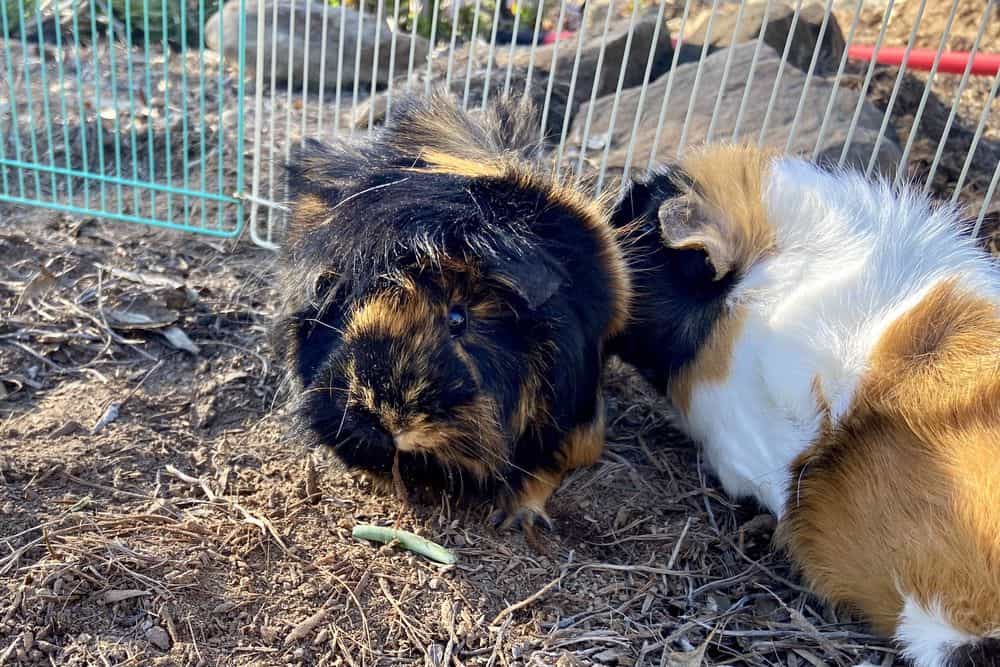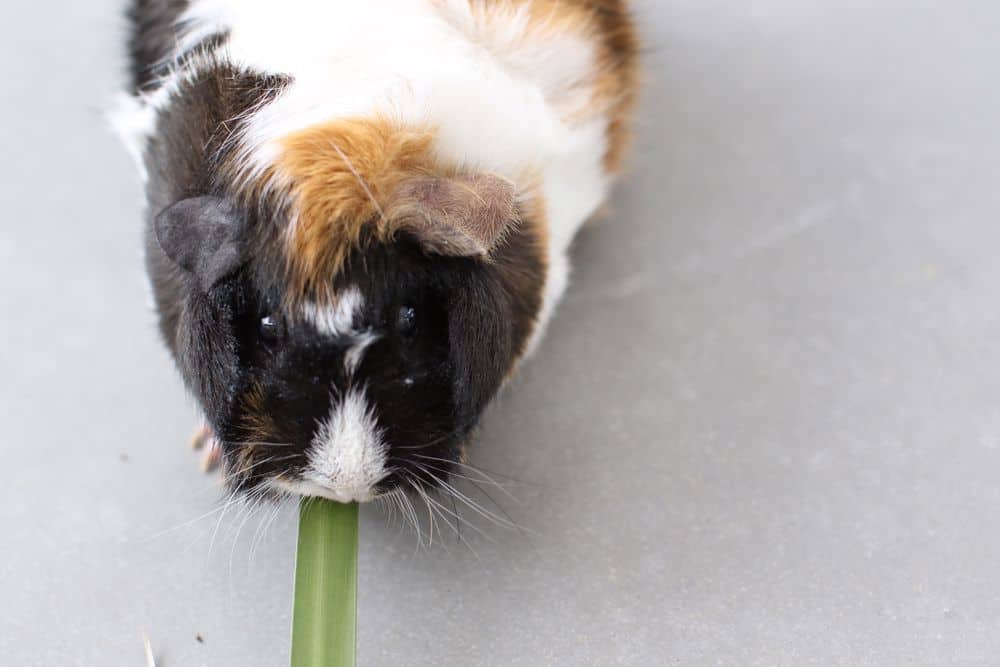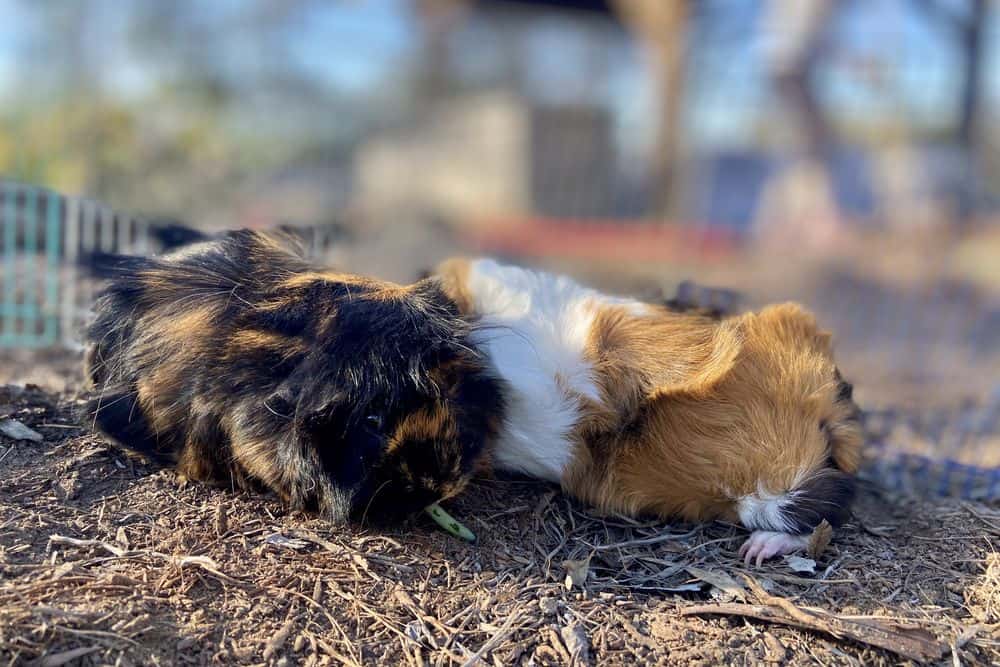As an Amazon Associate we earn from qualifying purchases.
Fleas are small, parasitic insects that feed on the blood of their hosts. While they commonly affect dogs and cats, fleas can also infect other animals which leads us to the question, can guinea pigs get fleas?
Can A Guinea Pig Get Fleas?
Guinea pigs are a common type of pet, and as such, they can get fleas just like any other animal. Fleas are small parasites that live on the blood of their host, and they can be very irritating and uncomfortable for the pet. If it has fleas, you will likely notice them scratching or chewing at their fur more than usual.

Taking Care Of Guinea Pig’s Fur
When it comes to taking care of your pet, one of the most important things to remember is keeping their fur clean and free of fleas. Not only will this keep them looking and feeling their best, but it will also help reduce the risk of an infestation. Here are a few tips for keeping your guinea pig’s fur clean and healthy:
- Make sure to groom your guinea pig regularly, using a soft brush to remove any dirt or debris.
- Inspect your pet’s fur for any sure sign of fleas or other parasites, and treat as necessary.
- Use a quality flea prevention product on your guinea pig’s fur, following the manufacturer’s instructions closely.
- Consider bathing your pet if they become particularly dirty or have a bad number of live fleas.
If you follow these tips, you can help keep your pet’s fur clean and healthy, which will help reduce the risk of fleas and other parasites.
Flea Prevention
There are a few preventative treatments you can do to help prevent fleas on your guinea pig:
- One is to keep their environment clean and free of debris that could attract fleas.
- You can also use a monthly flea treatment, like Advantage, to kill any fleas that may be present.
- Additionally, you can vacuum and sweep regularly to remove any fleas or eggs that may be lurking in your home.
- Keep your guinea pig away from other household pets in your home to avoid the further spread of these little pests.
- Use flea treatments you can buy from the vet or pet shops like flea shampoo, flea comb, to help you get started in treating fleas problem from your furry pet.
By following these tips, you can help protect your guinea pig from pesky fleas!
Where Do Fleas Come From?
Most fleas are tiny, parasitic creatures that can be found on the body of both animals and humans. They feed on blood and can cause serious health issues and a great deal of discomfort and irritation. Fleas thrive in warm, humid environments and can be difficult to get rid of.
The most common way to kill fleas is by coming into contact with an infected animal carrying fleas. Other pets such as your dog and cats are especially prone to getting fleas, but they can also be found on wild animals such as raccoons and opossums.
If you have one of these animals as a pet, it is important to act quickly to prevent them from getting fleas and to treat them if they do become flea-infested.

Fleas can also be spread through contact with the environment. They thrive in warm and humid climates and can be a serious problem that is difficult to get rid of.
Fleas can be found in areas where there is a lot of animal activity, such as pet areas, parks, and wooded areas. It is important to take steps to prevent even a single flea from coming into contact with your home and family.
Side Effects Of Having Fleas
Fleas are a common problem for guinea pigs and can cause several side effects if not treated. Some of the most common side effects of fleas include:
- Rashes or irritated skin
- Itching or scratching
- Hair loss
- Anemia
- Bacterial infections
If your furry pet has fleas, it is extremely important to treat them as soon as possible. Failure to do so can lead to serious health problems for your pet. There are several different treatments available, so talk to your veterinarian about the best option for your guinea pig.
Pet Care
Taking care of your guinea pig is important to ensure they live a long and healthy life. Here are some tips on how to take care of your guinea pig:
- Make sure your guinea pig has plenty of freshwater to drink.
- Feed your guinea pig a balanced diet that consists of hay, fresh vegetables, and pellets.
- Guinea pigs need exercise, so make sure you provide them with a safe place to play and run around.
- Keep your guinea pig’s cage clean and free of waste by cleaning it regularly.
- Make sure your guinea pig is vaccinated and spayed or neutered if necessary.
- Take your guinea pig to the vet for regular checkups.
By following these tips, you can help ensure your guinea pig stays healthy and happy!
Choosing The Right Shampoo
Flea shampoos for other guinea pigs come in a variety of types and brands. It can be difficult to determine which one is best for your pet. Some factors you should consider when choosing a flea shampoo include the ingredients, the type of shampoo, and your pet’s sensitivity to chemicals.

When looking for a flea shampoo, it is important to read the ingredient list carefully. Many shampoos contain harsh chemicals that can be harmful to your piggie if used incorrectly.
Ingredients found in dog shampoos like pyrethrins, vitamin c, and permethrins are particularly harmful and should be avoided.
The type of shampoo is also important. There are several different types available, including oatmeal-based shampoos, citrus-based shampoos, and herbal shampoos. Each type has its own set of benefits and drawbacks. It is important to choose a shampoo that will be effective in removing the fleas and flea eggs from your guinea pig’s coat without causing any irritation.
Finally, it is important to consider your pet’s sensitivity to chemicals. Some are more sensitive than others and may not be able to tolerate certain ingredients in a flea shampoo.
Final Thoughts
Fleas are a common problem for guinea pigs, and there are a few things that you can do to help prevent them from getting them in the first place. One of the best ways to keep your pet safe from fleas is to keep their environment clean and free of debris. You should also make sure to regularly groom it, and check for any sure sign of fleas or ticks.
If you do find that your pet has fleas, there are a few treatments that you can try. However, it is important to note that some of these treatments can be harmful if used incorrectly. So, if you suspect that your pet has fleas, it is best to consult with your veterinarian before starting any treatment.
Thank you for reading! We hope this article was helpful and provided you with some useful information on how to prevent and treat fleas in your furry friends.